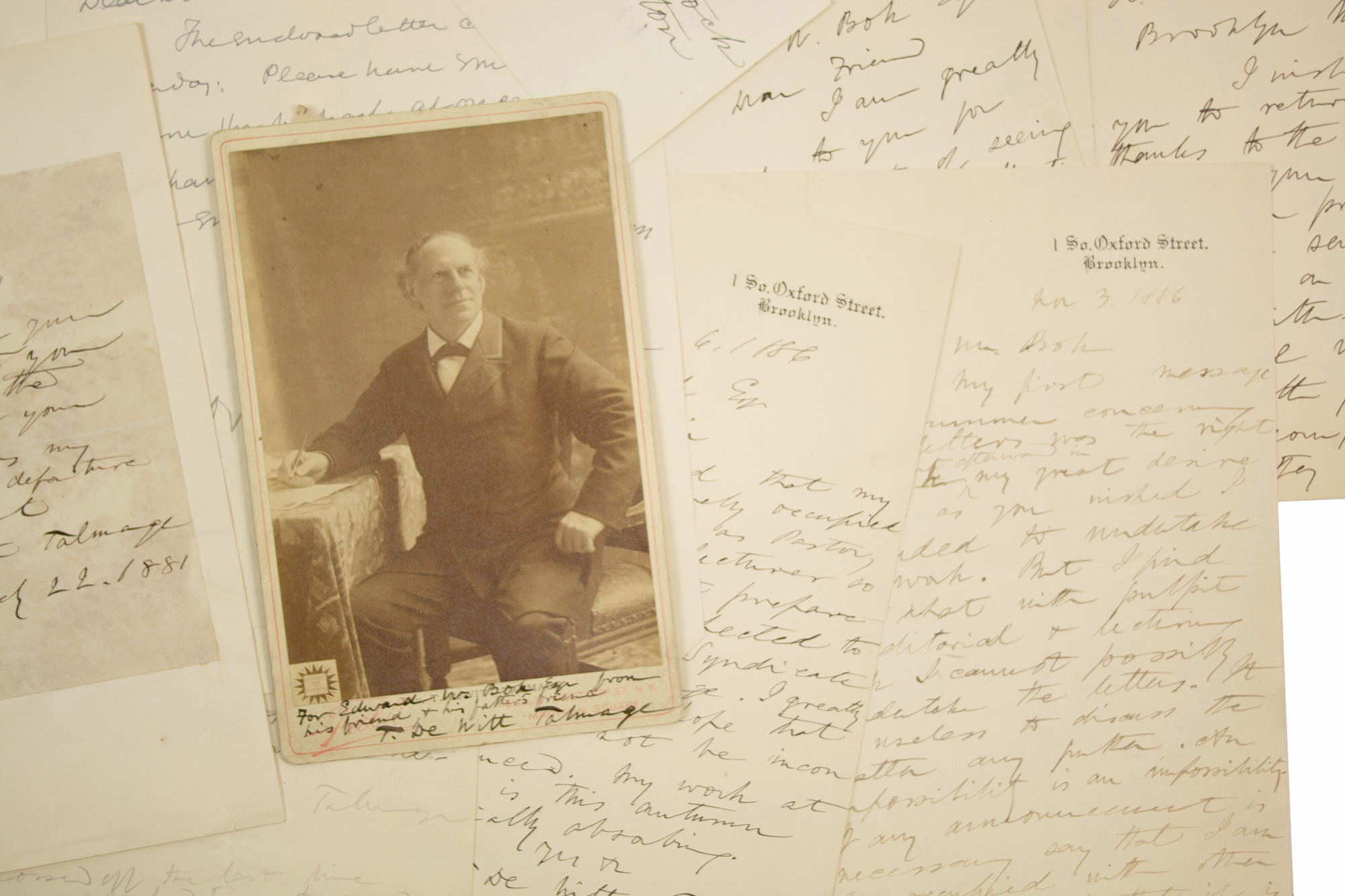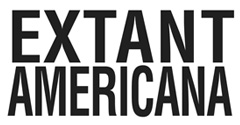 Thomas De Witt TALMAGE (1832-1902)* An archive of 31 letters and notes consisting of 20 Autograph Letters Signed, 5 Autograph Notes Signed, 2 Autograph Notes, and 1 Letter Signed, 46 pp., ranging in size from 53 x 92 mm. (2 x 3 5/8 in.) through 202 x 251 mm. (8 x 9 7/8 in.), various places, but largely Brooklyn, N.Y., 22 February 1881 – 4 April 1892 (6 pieces undated), most accomplished in ink (but several in pencil) written primarily to Ladies’ Home Journal editor Edward W. Bok concerning publishing matters. Offered together with two cabinet card photographs of Talmage, both signed and inscribed to Bok, as well as a printed circular letter concerning the misattribution of an article to Talmage, 28 May 1888.
Thomas De Witt TALMAGE (1832-1902)* An archive of 31 letters and notes consisting of 20 Autograph Letters Signed, 5 Autograph Notes Signed, 2 Autograph Notes, and 1 Letter Signed, 46 pp., ranging in size from 53 x 92 mm. (2 x 3 5/8 in.) through 202 x 251 mm. (8 x 9 7/8 in.), various places, but largely Brooklyn, N.Y., 22 February 1881 – 4 April 1892 (6 pieces undated), most accomplished in ink (but several in pencil) written primarily to Ladies’ Home Journal editor Edward W. Bok concerning publishing matters. Offered together with two cabinet card photographs of Talmage, both signed and inscribed to Bok, as well as a printed circular letter concerning the misattribution of an article to Talmage, 28 May 1888.
Bok was only eighteen when he began corresponding with Talmage, a friend of his father, the recently deceased Jan Hiddle Bok. Bok first made an impression on the preacher with his sizable autograph collection, and his idea that handwriting could reveal underlying personality traits. Talmage disagreed, writing in June 1883, “I am more persuaded than ever before that it will be difficult to reduce Chirography to a science. Bold hand-writing by timid men, & reckless penmanship by those distinguished for caution & prudence. In looking through your autographs I come to the conclusion that the style of hand-writing is no index of character.” Apparently interested to help a recently fatherless aspiring journalist make his way in the world, Talmage helped Bok from time to time with introductions to magazine editors. When Bok began editing the Brooklyn Magazine in 1884, Talmage offered his help by allowing the young editor to republish some of his selected writings. As their relationship matured, problems arose on occasion. In 1887, Talmage penned a strongly worded letter asking Bok to correct the published impression (with news clipping attached) that his sermons had been discontinued in the Brooklyn Magazine due to lack of interest. Bok issued a public correction in the press (as also noted in a new clipping also attached).
Bok’s occasional editorial errors (one prompted a lengthy printed circular, included in this collection) did not appear to alter Talmage’s opinion of the young journalist. In 1889, he wrote a letter of introduction for the 25 year old Bok to then Postmaster General, John Wanamaker, the Philadelphia department store magnate as “an elder in my church, a stout Presbyterian, & does not want a Post Office. He visits Washington to see ‘the sights.’ He is the founder of ‘The Bok Syndicate’, an institution of wide literary influence. He will make a call of courtesy.” The following year, Bok moved to Philadelphia to assume the editorship of the Ladies Home Journal — a position that he would hold for nearly thirty years. The same year, Talmage took over the editor’s post at the Christian Herald.
After this point, the frequency of correspondence tapers off dramatically, perhaps prompted a letter penned in the early 1890s advising Bok that “…I am in a peck of trouble about an advertisement you made. I have become editor of the ‘Christian Herald’ & with the understanding that I withdraw from all other newspaper work. Now the advertisement which makes me so prominent in your paper following the announcement that I was once of the Editors of the Ladies’ Journal on an immense salary. You can see [that it] puts me at a great disadvantage. You will please not advertise me in connection with the Ladies’ Journal…” The last dated letter from Talmadge in the correspondence was written in April 1892.
Full list upon request.
Two of the letters have been mounted to larger sheets with some toning, most bear expected mailing folds, else fine condition overall.
(EXA 4645) $2,000
__________
* Thomas De Witt TALMAGE was a prominent American reformist preacher, orator, Anglican divine author and editor. He graduated from New York University in 1853 and studied law before entering the ministry and earning his Doctor of Divinity from the Reformed Dutch Theological Seminary in New Jersey. He served as a Union Army chaplain during the American Civil War. In 1862, he became the pastor of the Second Reformed Dutch Church (later the Reformed Church in America) in Philadelphia, serving until 1869 when he assumed the pulpit at the Central Presbyterian Church in Brooklyn, where his popularity soared. Three tabernacles were constructed between 1870 and 1894 in an effort to accommodate Talmage’s ever-increasing audience, but all three were ravished by fire, prompting Talmage to accept a position as associate pastor at the First Presbyterian Church in Washington DC, which he maintained until 1899. Throughout his career, his sermons were syndicated regularly in newspapers across the country.
